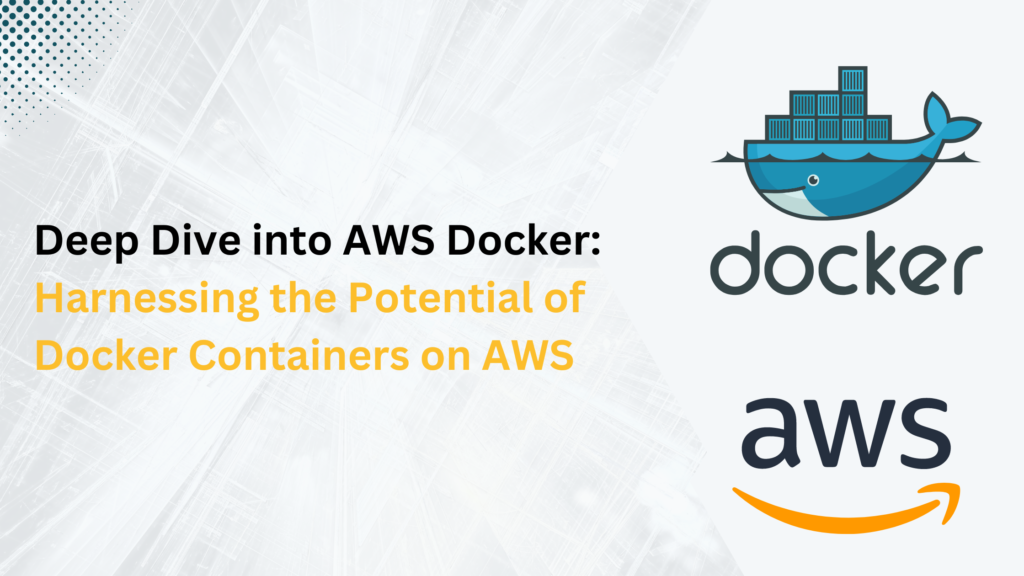Understanding the Integration of Docker Containers in the AWS Ecosystem

AWS Docker refers to the combination of Amazon Web Services (AWS) and Docker, which enables developers to deploy and manage applications using Docker containers on the AWS cloud platform. To fully grasp the concept of AWS Docker, it’s essential to understand the following related concepts:
Docker Containers: Docker is an open-source platform that facilitates the packaging, distribution, and execution of software applications in lightweight, isolated containers. Containers provide a consistent runtime environment that encapsulates all the dependencies required for an application to run, ensuring consistency across different systems and environments.
Amazon Elastic Container Service (ECS): ECS is a fully managed container orchestration service provided by AWS. It simplifies the deployment and management of Docker containers by handling cluster management, task scheduling, and load balancing. With ECS, you can easily scale your containerized applications and run them in a highly available environment.
Amazon Elastic Kubernetes Service (EKS): EKS is a managed Kubernetes service by AWS. Kubernetes is an open-source container orchestration platform that automates the deployment, scaling, and management of containerized applications. EKS eliminates the need for manual setup and management of Kubernetes clusters, allowing developers to focus on deploying and managing applications.
AWS Fargate: Fargate is a serverless compute engine offered by AWS, compatible with both ECS and EKS. It abstracts away the underlying infrastructure, allowing you to run containers without the need to provision or manage servers. Fargate enables you to focus solely on deploying and managing your containers, while AWS takes care of the infrastructure scaling and management.
Amazon Elastic Container Registry (ECR): ECR is a fully managed Docker container registry provided by AWS. It allows you to securely store, manage, and deploy Docker images. ECR integrates seamlessly with ECS, EKS, and other AWS services, enabling you to easily push and pull container images for deployment.
AWS Identity and Access Management (IAM): IAM is a service that provides secure access control and identity management for AWS resources. It allows you to define fine-grained access policies and permissions for various AWS services, including those used in conjunction with AWS Docker. IAM ensures that only authorized individuals or services can interact with your Docker containers and related resources.
Amazon CloudWatch: CloudWatch is a monitoring and observability service offered by AWS. It provides real-time monitoring, logging, and metrics for your Docker containers and applications running on AWS. With CloudWatch, you can gain insights into the performance, health, and behavior of your containerized applications, helping you troubleshoot issues and optimize performance.
AWS Auto Scaling: Auto Scaling is a feature provided by AWS that allows you to automatically adjust the number of instances or containers running based on demand. By utilizing Auto Scaling, you can optimize resource utilization and ensure that your containerized applications can scale up or down as needed, without manual intervention.
AWS Security and Compliance: AWS provides robust security measures and compliance certifications to protect your containerized applications. This includes features such as network isolation through Amazon Virtual Private Cloud (VPC), security groups, encryption, and access control through IAM. AWS also offers various compliance certifications to meet industry-specific regulatory requirements.
Cost Optimization: AWS offers several cost optimization options for AWS Docker deployments. This includes utilizing auto-scaling features to scale your containers based on demand, which optimizes resource usage and reduces costs. Additionally, services like AWS Cost Explorer and AWS Budgets help monitor and manage container-related expenses, ensuring efficient utilization of resources.
Understanding AWS Docker and the related concepts mentioned above provides a solid foundation for deploying and managing containerized applications on the AWS cloud platform. By leveraging the benefits of Docker’s containerization and the scalable infrastructure provided by AWS, developers can build scalable, flexible, and reliable applications in a cost-effective manner.

Leave a Reply